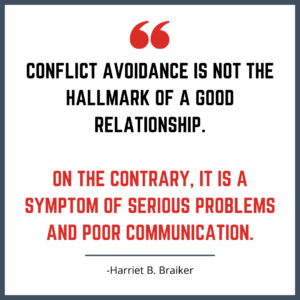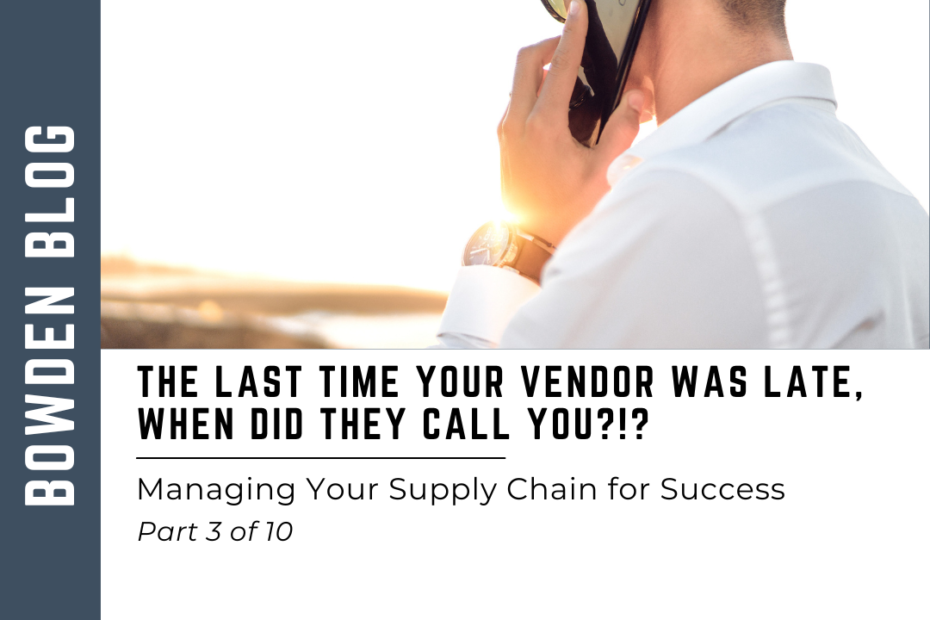Managing Your Supply Chain for Success
Part 3 of 10
We continue our Managing Your Supply Chain Series with Vendor Communication!
It’s been said that “A relationship without communication is just two people.” In the case of Customers and Vendors, it’s just two companies. With a positive communications system, however, those two companies can be Partners!
Since we are both a Vendor to some companies and a Customer to others, we deal with both sides of this Communication equation.
This week, we’ll consider three questions for you to consider around Vendor Communications:
1. The last time your Vendor was late with an order, when did they call you to let you know?
The most common answer to that question is, “They didn’t! I had to contact them.”
Why do you suppose they didn’t call you? Do you believe they didn’t know the order was going to be late? More likely, they were hoping you wouldn’t notice until they delivered the parts.
When should your Vendor tell you when an order might be late? The best answer is “As soon as they knew it likely that the delivery wasn’t going to happen on time.”
Letting your Vendor know that you’d rather deal with facts than with a mystery is an important point to get across. How you react when you get bad news will influence their future behavior. If you get mad and yell at them, they might try to postpone future uncomfortable discussions as often as possible. On the other hand, if you start working with them to help solve the problem, they’ll be more likely to tell you the next time.
Having an early conversation about a potential late shipment helps you adjust your plans and schedule, and provides an opportunity for you to clarify with your Vendor more details around your specific needs. This can help you work through the problem together and will yield better outcomes, despite the tardy delivery.

2. Do your Vendors have a system in place for communicating with you?
Hopefully, they have a proactive system that will consistently provide updates to you from receipt of the order through delivery without needing to be asked. If that’s not part of your Vendor’s normal practices, then you can ask them to do it. Perhaps they’ll do it just for you and your orders, so you can stay in the loop on their progress.
If they aren’t able to provide consistent updates without prompting, then you’ll need to adjust your system accordingly. Having current information on your orders with your Vendor will keep your schedule updated with the latest data. You can build into your system a method to prompt them for consistent updates, even if it’s just a weekly email to your Vendor with your current list of open orders and a request for status updates. You can’t afford to rely on “No news, good news.”
Of course, there won’t be much “News” about your orders if they’re produced and shipped on time. But consistent communication with your Vendors helps ensure you get good data, regardless of their ability to send you unprompted updates.
3. Does your system require an order acknowledgment from your Vendors?
It should!
Having your Vendor acknowledge receipt of your orders is an important step in the process of making sure you’re on the same page. Their reviewing of the order and sending an acknowledgement helps ensure that they’ve seen the data on the order (pricing, quantity, lead time/etc.) and it’s agreeable to them. If there are questions about any aspect of your order, it’s best to prompt that discussion sooner, rather than later.
When a Vendor acknowledges an order without asking any questions, you often assume that they expect to complete the order as written, but you’d prefer not to base your success on assumptions. Prompting more than just a cursory email exchange can provide substance to their order acknowledgement.
What’s the biggest downside of not requiring an order acknowledgement? Sometimes an order doesn’t make it to your Vendor at all and doesn’t get entered in their system! If you don’t catch it when that happens, you can be in big trouble. Avoiding such a catastrophe through your basic system requirements can save you tremendous pain, so make sure you have a means to track the receipt of order acknowledgements.
Final Thoughts
Having a strong line of communication with your Vendors is crucial to your success.
These three questions will help you consider how to improve your communication system with your Vendors and maximize the opportunity to have the data you need to be successful.
Encouraging open communications, even when the update isn’t what you want to hear, driving systematic updates, and requiring order acknowledgments will all help improve your results. It’s easy to blame your Vendors for their poor performance, but there are many ways to help them provide what you need if you can build your communication system with them.
In Part 4 of our Managing your Supply Chain for Success Series, we’ll be talking about the people you interact with at your Vendors and how to ensure you get the information you need to be successful!
